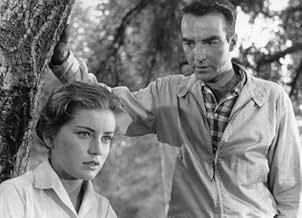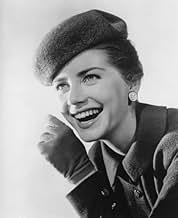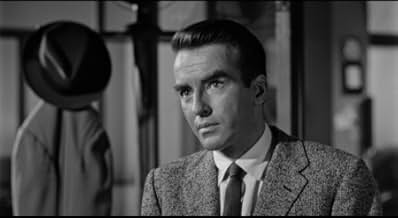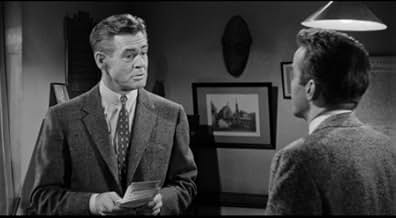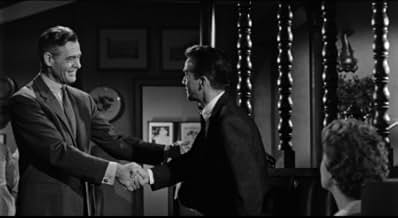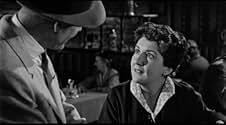Lonelyhearts
- 1958
- 1h 40m
IMDb RATING
6.6/10
1.6K
YOUR RATING
Eager for a job, journalist Adam White accepts the lowly position of columnist for the advice-giving section of the Chronicle but he often clashes with his cynical editor, Shrike.Eager for a job, journalist Adam White accepts the lowly position of columnist for the advice-giving section of the Chronicle but he often clashes with his cynical editor, Shrike.Eager for a job, journalist Adam White accepts the lowly position of columnist for the advice-giving section of the Chronicle but he often clashes with his cynical editor, Shrike.
- Director
- Writers
- Stars
- Nominated for 1 Oscar
- 2 nominations total
Johnny Washbrook
- Johnny Sargeant
- (as John Washbrook)
- Director
- Writers
- All cast & crew
- Production, box office & more at IMDbPro
Featured reviews
In view of some of the comments categorizing this film as unsatisfying soap opera, it all depends on what you're looking for. If what you want are excellent performances from a superior cast, then this is your kind of movie. Robert Ryan gives his typical outstanding performance as an extremely cynical newspaper editor who inflicts his particular brand of misery to the full on his long-suffering wife, beautifully portrayed by Myrna Loy. Maureen Stapleton is electrifying in her movie debut and received a well-deserved Oscar nomination for her riveting performance. Montomgery Clift's fragility works to his advantage here as an advice columnist whose sensitivity runs a little too deep. The haunted eyes and pained expressions perfectly match what the character in this situation would realistically feel and express. Overall, a nicely done, well-photographed film that is sure to hold the attention and is definitely worth the time to find and view.
... because of its cynicism and brutal honesty portrayed by the characters. However, at the end of it, I felt the men and women who worked on the film put forth a very good product. The underlying moral tones in the film got a little preachy to me, but it was from 1958, and adultery was still pretty big deal back then.
Montgomery Clift has the lead in this one, and while he does his usual good work, I thought his delivery of lines was quite similar to the way he played characters in "Judgment at Nuremburg", "A Place in the Sun", and "From Here to Eternity"--it seemed halted or deliberately tentative. If that's what the role called for, then he did well. If not, well, it just seemed hackneyed (to me anyway). I much rather like Clift in roles like he had in "The Search".
Robert Ryan was verbally sadistic in this one, and I thought he gave a fine performance, although admittedly, I haven't seen too many of his films. Myrna Loy played his wife and had a really emotional scene with Ryan in their apartment...and I absolutely loved it...it's not something you see from her all the time! Jackie Coogan and Dolores Hart provide good supporting roles, as does Maureen Stapleton as a sensuous psycho! Too bad for moviegoers that Hart answered a higher calling. I thought she was really good in this.
Montgomery Clift has the lead in this one, and while he does his usual good work, I thought his delivery of lines was quite similar to the way he played characters in "Judgment at Nuremburg", "A Place in the Sun", and "From Here to Eternity"--it seemed halted or deliberately tentative. If that's what the role called for, then he did well. If not, well, it just seemed hackneyed (to me anyway). I much rather like Clift in roles like he had in "The Search".
Robert Ryan was verbally sadistic in this one, and I thought he gave a fine performance, although admittedly, I haven't seen too many of his films. Myrna Loy played his wife and had a really emotional scene with Ryan in their apartment...and I absolutely loved it...it's not something you see from her all the time! Jackie Coogan and Dolores Hart provide good supporting roles, as does Maureen Stapleton as a sensuous psycho! Too bad for moviegoers that Hart answered a higher calling. I thought she was really good in this.
I have been a Clift fan for years reading his biographies and having seen all of his films numerous times. The only exception was the 1958 film Lonelyhearts; for some reason I couldn't locate a DVD and had missed it when shown on TCM. I finally caught up with it on the network this week and all what I heard about the film to my perspective was misdirected. I had read/heard it was a soap opera, meandering and somewhat lifeless. As I saw this movie almost a week ago I can't help in not thinking about it from time to time. To me this was a moving film with amazing performances topped by Stapleton, Ryan and of course Clift. Monty Clift...what a gift of an actor who in this role after his major auto accident plays his character with such intensity and emotion. Incredible. There are scenes where you can see the emotion in his eyes that are so moving and the thought processes of the impact of his actions are so simple but awe inspiring and transparent. He was truly an artist and the shame of it was because of all the pain and ups and downs in his personal life we never got to see his full potential. The amazing Robert Ryan is incredible as well as he plays a cynical character with variation and depth that you have to marvel at the dexterity he uses in communicating the pain and mistrust of anyone he comes into contact with. Great actor. Maureen Stapleton is brilliant with her longing for connecting to something she is missing in her life and right when you begin to feel sympathy she changes on a dime. Brilliant! The only reason I gave it an 8 was the structure of the script and the backstory of Clift's character was a bit weak and rushed. Never the less...very good film that is a near not to be missed because of the performances. Must see for Clift fans.
Interesting newspaper tale with Montgomery Clift as interesting as ever, even though he'd had his car accident which changed his face. One of the best actors ever (along with Brando). He was great for the last 10 years of his life after his tragedy. Maureen Stapleton was heartbreakingly ignorant. Robert Ryan tough as nails. Myrna Loy beautiful and sensitive in a strange marriage and Mike Kellin adds authenticity. A great book by Nathaniel West who wrote DAY OF THE LOCUST.
I know this film bombed in '58..who cares? Too hip for the room. Definitely in the top ten of that year and Clift added another great character, even though he must have been in pain. Best performance = Maureen Stapleton (nominated).
I know this film bombed in '58..who cares? Too hip for the room. Definitely in the top ten of that year and Clift added another great character, even though he must have been in pain. Best performance = Maureen Stapleton (nominated).
Nathaniel West's "Lonelyhearts" is a haunting novella about how an idealistic young man is affected by his job as an advice-giving columnist for his town's newspaper. It was intelligently adapted for the stage in the mid-50's, and the film version plainly uses that adaptation as a reference point as much as the novel itself. In ways, the film expands on the play's success, opening it up to reveal an idealized 50's picture-postcard town on the surface before centering on the insensitivity lying just underneath. Writer/Producer Schary and Director Donohue are to be commended for the atmosphere they have successfully created. It is unfortunate that they did not have enough faith in the material to resist the temptation to give it a happy ending, an ending which really is not in keeping with the events which precede it.
It must have seemed like a great idea to cast Montgomery Clift in the lead role of Adam, and a few years earlier it would have been, but this compelling actor's personal demons had so impacted upon him by this time that it is impossible not to be distracted by his unhealthy state of being. His slurred speech, unsteady gait and jerky mannerisms are entirely at odds with this character, who is said to have never had a stronger drink than a coca-cola. He is too good of an actor not to have effective moments - he works beautifully with Onslow Stevens, who plays his father - but this is a performance that holds our attention largely for unintentional reasons. Maureen Stapleton is sensational in her film debut as a writer to the column who manipulates Adam, and her performance would be right at home in a more faithful and successful version of this novel. Otherwise, this is a well-intended film which fails both to adequately reflect the novel on which it is based and to succeed on it's own terms.
It must have seemed like a great idea to cast Montgomery Clift in the lead role of Adam, and a few years earlier it would have been, but this compelling actor's personal demons had so impacted upon him by this time that it is impossible not to be distracted by his unhealthy state of being. His slurred speech, unsteady gait and jerky mannerisms are entirely at odds with this character, who is said to have never had a stronger drink than a coca-cola. He is too good of an actor not to have effective moments - he works beautifully with Onslow Stevens, who plays his father - but this is a performance that holds our attention largely for unintentional reasons. Maureen Stapleton is sensational in her film debut as a writer to the column who manipulates Adam, and her performance would be right at home in a more faithful and successful version of this novel. Otherwise, this is a well-intended film which fails both to adequately reflect the novel on which it is based and to succeed on it's own terms.
Did you know
- TriviaMyrna Loy arrived on set to find Montgomery Clift very nervous about meeting and working with her as he had been a big fan of hers for years. Loy was very flattered by this and the two formed a close friendship.
- GoofsIn opening scene, Adam orders ginger ale "on the rocks" - which arrives with one minuscule cube that disappears and materializes from shot to shot.
- Quotes
William Shrike: ...I enjoy seeing youth betray their promises. It lights up all the numbers on my pinball machine.
- ConnectionsReferenced in Montgomery Clift (1983)
- How long is Lonelyhearts?Powered by Alexa
Details
- Release date
- Country of origin
- Language
- Also known as
- Das Leben ist Lüge
- Filming locations
- Production company
- See more company credits at IMDbPro
- Runtime
- 1h 40m(100 min)
- Color
Contribute to this page
Suggest an edit or add missing content

